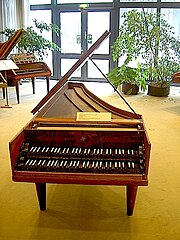Chromatic Fantasia and Fugue
| Chromatic Fantasia and Fugue | |
|---|---|
| BWV 903 | |
| by J. S. Bach | |

The Bach Harpsichord in the Berlin Musical Instrument Museum
|
|
| Key | D minor |
| Composed | ca. 1720 |
| Scoring | Harpsichord |
The Chromatic Fantasia and Fugue in D minor, BWV 903, is a work for harpsichord by Johann Sebastian Bach. Bach probably composed it during his time in Köthen from 1717 to 1723. The piece was already regarded as a unique masterpiece during his lifetime. It is now often played on piano.
An autograph of this work is not known. The musicologist Walther Siegmund-Schultze pinpoints the work to the "fermenting Köthen works" because of its improvisatory and expressive nature, using all keys.
At least 16 different handwritten copies of the score are extant, including five from Bach's lifetime. The oldest copy is only an early, two-bar shorter variant of the fantasia. It was written by Bach's pupil Johann Tobias Krebs and was created after 1717, close to the time of origin. Two other copies emerged around 1730 that include the fugue; they were possibly written by Gottfried Grünewald or Christoph Graupner. A copy of the double work comes from Johann Friedrich Agricola and was written between 1738 and 1740. A manuscript from 1750 is extant, and a complete copy by Johann Nikolaus Forkel (1800). From these two manuscripts come the first printed editions of the piece by Franz Anton Hoffmeister (1802) and Friedrich Konrad Griepenkerl (1819). Because of significant differences in details, which can not be traced back to a common basic shape, it is assumed that Bach himself composed the various different versions of the work that are in circulation.
Because of its characteristics the piece became known as Chromatic, a term that did not originate with Bach.
...
Wikipedia
